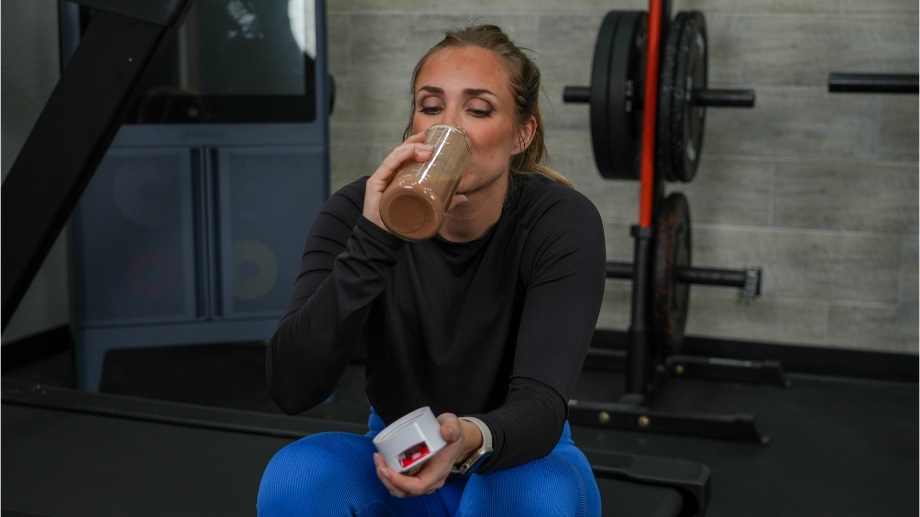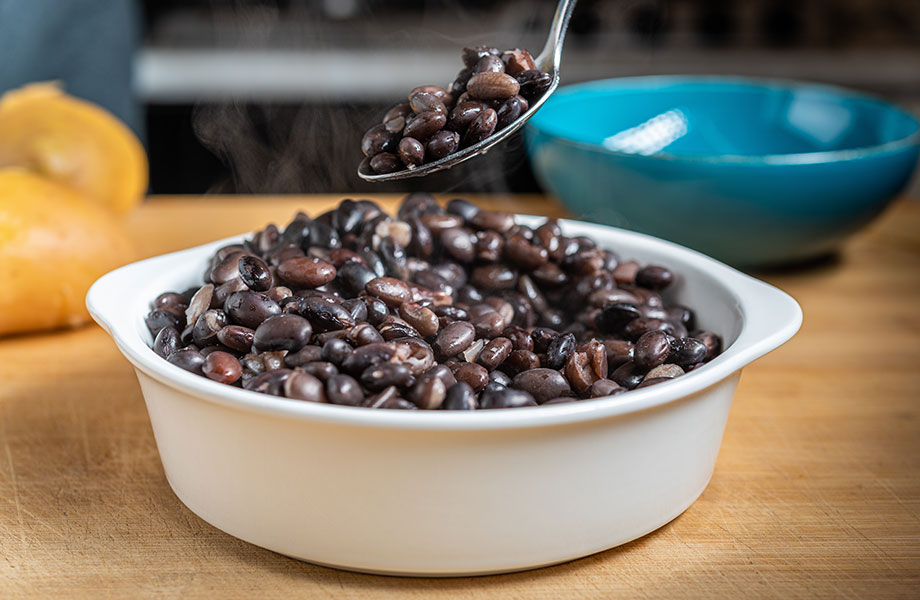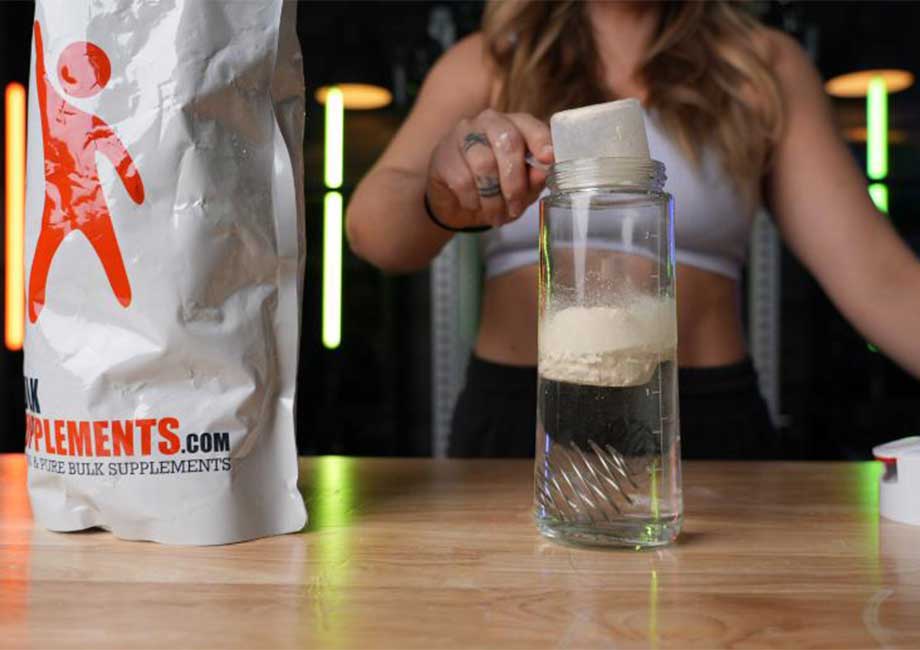You’re all about eating more protein to build muscle, increase strength, and recover after a workout. You’ve stocked up on the best protein powders, meal-prepped some seriously impressive high-protein entrees, and packed your gym bag full of protein bars, but could you be taking this obsession a little too far? How much protein is too much?
Building muscle requires considerably more protein than what’s needed for maintenance. Increasing protein intake suppresses muscle protein breakdown1, resulting in a positive net protein balance needed to build muscle mass and boost metabolism. With those benefits, it’s no wonder you’re feeling a protein craze!
However, too much of a good thing can be a bad thing, and this rings true for protein intake. Overdoing it can be wasteful, ineffective, and even harmful. In this article, we’ll review how much protein is too much, if it’s bad for you, and how much daily protein intake to aim for to get the best results.
Medical disclaimer: This article is intended for educational and informational purposes only. It is not intended as a substitute for medical advice. For health advice, contact a licensed healthcare provider.
How Much Protein Is Too Much?
It’s difficult for the average person to eat too much protein per day, but it can happen—especially if you’re throwing back protein shakes regularly. According to the Mayo Clinic2, you shouldn’t consume more than 2 grams of protein per kilogram of body weight daily.
Following this recommendation, someone weighing 150 pounds wouldn’t want to eat more than 136 grams of protein daily. To put this into perspective, a high-protein meal generally has between 20 to 40 grams of protein. You would likely need to eat several high-protein meals plus high-protein snacks or protein powder supplements to eat that much protein!

RELATED: Best-Tasting Protein Powder
There is some preliminary evidence3 suggesting that much higher protein intake (>3g/kg/day) could benefit body composition. However, a 2014 study4 found that a very high protein consumption of 4.4 grams per kilogram of body weight did not result in significant changes in body composition compared to the control group.
How Much Protein Do You Need?
The recommended dietary allowance (RDA) for protein is 0.8 grams per kilogram of body weight daily. This is the average dietary daily protein intake considered sufficient for most healthy individuals. Under this recommendation, a person weighing 150 pounds would need 55 grams of protein daily.
That said, more recent research5 indicates that protein intakes above the current RDA help promote healthy aging, appetite regulation, weight management, and athletic performance.
Reputable organizations, including the Academy of Nutrition and Dietetics, American College of Sports Medicine, and International Society for Sports Nutrition, recommend increasing protein intake to 1.2 to 2.0 grams per kilogram of body weight per day to support muscle growth, post-workout recovery, and performance5.
This wide protein intake range may leave the average person with more questions than answers. Activity level, age, and body size all play a role in determining personalized protein needs. If you’re an avid gym goer or bodybuilder, your high physical activity level may necessitate a protein intake on the higher end of this range, especially if you’re looking to maximize muscle strength and size.
Work with a registered dietitian specializing in sports nutrition to determine the amount of protein you need to reach your goals.
Tips To Incorporate Protein Into Your Diet
If you’re struggling to hit your daily protein goal, don’t worry—here are simple and effective ways to ensure you’re getting sufficient protein throughout the day.
Start Your Day With Protein
Add protein-rich foods like eggs, Greek yogurt, or your favorite protein smoothie recipe to your breakfast to kickstart your day.

Include Protein in Snacks
Keep high-protein snacks handy, such as nuts, cheese, or protein bars, to help fuel your metabolism throughout the day.
RELATED: Best Protein Bars
Add Protein to Salads
Enhance your salads with protein sources like grilled chicken, tofu, beans, or quinoa to make them more filling and nutritious.
Use Protein Supplements
For a convenient protein boost, add protein powders to smoothies, oatmeal, or baked goods.

RELATED: Best Protein Powder For Smoothies
Incorporate Dairy or Dairy Alternatives
Add milk, cottage cheese, or plant-based alternatives to your meals and snacks for an extra protein punch.
Prepare Protein-Rich Meals Ahead
Batch-cook protein-rich dishes like grilled meats, lentil soups, or stir-fries to have ready-to-eat meals throughout the week.
Choose Lean Proteins
To meet your protein needs without excessive fat, opt for lean protein sources like turkey, chicken breast, fish, or plant-based proteins.
RELATED: Plant Protein Vs Animal Protein
Good Sources Of Protein
Ensuring a balanced protein intake from various sources is key to meeting your nutritional needs. Here are some excellent protein sources organized by type to help you diversify your diet.
Animal Sources

- Chicken breast: A lean and versatile protein source
- Turkey: Low in fat and high in protein
- Fish: Rich in protein and omega-3 fatty acids (e.g., salmon, tuna)
- Eggs: Highly nutritious and easy to prepare
- Dairy: Milk, cheese, and Greek yogurt provide high-quality protein
Plant-Based Sources

- Legumes: Beans, lentils, and chickpeas are great for protein and fiber
- Tofu and tempeh: Excellent soy-based protein alternatives
- Quinoa: A complete protein containing all nine essential amino acids
- Nuts and seeds: Almonds, chia seeds, and hemp seeds are protein-dense snacks
Supplements

- Whey protein: Fast-digesting and popular among athletes
- Casein protein: Slow-digesting, ideal for nighttime use
- Plant-based protein powders: Options like pea, hemp, and rice protein for vegetarians and vegans
- Protein bars: Convenient for on-the-go protein boosts
RELATED: What Is Protein Water?
Is Too Much Protein Bad For You?
You might have heard that eating too much protein could cause kidney damage. However, there’s no significant evidence6 linking high protein intake to kidney damage in healthy, exercising individuals.
A series of studies spanning up to one year in duration utilized protein intakes of up to 2.5 to 3.3 grams per kilogram of body weight per day in healthy resistance-trained individuals and found that increased protein intakes exerted no harmful effect on blood lipids or markers of kidney and liver function3.
On the contrary, excess protein can cause harm to those with pre-existing kidney disease because the damaged kidneys have to work harder to filter out nitrogen and other waste products of protein metabolism.

Evidence regarding the relationship between high protein intake and kidney stone formation is inconsistent. While some studies found no association between protein intake and stone formation, one 2021 systematic review7 indicated that high-protein diets increased urinary calcium excretion, a risk factor for calcium stone formation.
Additionally, eating too much protein in the form of red or processed meat could put you at an increased risk of cancer8. A diet high in red and/or processed meat is linked to colorectal, pancreatic, breast, and prostate cancer.
If most of your protein intake comes from red meat or full-fat dairy foods, you may also be at a higher risk of developing heart disease. This is likely due to the saturated fat and cholesterol content of these high-protein food sources.
RELATED: High-Protein Vegetables
How Can You Tell If You’re Getting Too Much Protein?
While you need protein to support muscle growth, hormone production, and other bodily functions, it is possible to over consume this macronutrient. Here are some early warning signs that you could be consuming too much protein.
- Bad breath: High-protein, low-carb diets can cause you to enter a state of ketosis, where one of the side effects can be fruity-smelling breath.
- Constipation: Insufficient fiber intake from high-protein diets can make stools harder to pass.
- Weight gain: Prolonged high protein intake can result in excess calorie consumption and fat storage.
- Dehydration: Increased urine output from protein metabolism may necessitate higher water intake.
- Nutrient deficiencies: Eating too much protein can reduce your intake of essential fruits, vegetables, whole grains, and healthy fats. This can lead to nutrient deficiencies, affecting your performance in and out of the gym.
RELATED: Best Fiber Supplements for Constipation
Does Exercise Affect How Much Protein I Need?
Protein needs vary depending on how active you are. Very active individuals need enough protein to maintain lean mass and build and repair muscle after a workout.
People who exercise regularly need around 1.1 to 1.5 grams of protein per kilogram of body weight daily2. Increased protein intake is necessary for maintaining lean muscle mass for activities like yard work, walking, and riding a bike.

Those who do strength training or train for endurance events need 1.2 to 1.7 grams of protein per kilogram of body weight daily2. During intense bouts of resistance exercise, the proteins that make up your muscle fibers become damaged, and increased protein is needed post-workout to repair and rebuild skeletal muscle tissues3.
When increasing your protein intake to align with your activity level, choose protein-rich foods low in saturated fat and cholesterol and limit your intake of processed meats. Include sources of protein such as legumes, nuts, fish, chicken breast, pork, lean beef, and low-fat dairy products as part of a balanced diet.
How Much Protein Is Too Much? Final Thoughts
While increasing your protein intake can provide the body with many health benefits, there is such a thing as too much of a good thing. Eating more than 2 grams of protein per kilogram of body weight daily may increase your chances of developing kidney stones, cancer, and heart disease.
You may be eating too much protein if you are neglecting other important nutrients like fiber and healthy fats. Bad breath, constipation, weight gain, and dehydration could be signs that you’re overdoing it on the protein.
- The RDA for protein intake is 0.8 g/kg/day for healthy adults.
- If you are regularly physically active, you may have increased protein needs of 1.1-1.5 g/kg/day.
- If you do strength training or are training for an endurance event, an even higher protein intake of 1.2-1.7 g/kg/day may be appropriate.
- It’s not recommended to consume more than 2 g/kg/day, as this could be harmful and likely won’t provide additional benefits.
How Much Protein Is Too Much? FAQs
Is 200g of protein a day too much?
It’s not recommended to eat more than 2 grams of protein per kilogram of body weight a day. Following this recommendation, a healthy adult weighing 220 pounds could eat up to 200 grams of protein daily. However, if you weigh less than 200 pounds, this amount of protein could be excessive.
Is 100 grams of protein a day too much?
It’s not recommended to eat more than 2 grams of protein per kilogram of body weight a day. Following this recommendation, a healthy adult weighing 110 pounds could eat up to 100 grams of protein daily. This amount of protein may be excessive if you weigh less than 110 pounds.
What are the symptoms of too much protein?
Symptoms of excessive protein intake can include digestive issues like constipation or diarrhea, dehydration, kidney strain, and potential nutrient imbalances.
How many grams of protein is too much a day?
According to Harvard Health, the average person should aim for no more than 2 grams of protein per kilogram of body weight per day. Some athletes may be able to consume up to 3.5 grams per kilogram of body weight. According to the Dietary Guidelines for Americans, adults should get between 10% and 35% of their daily energy intake from protein.
These statements have not been evaluated by the Food and Drug Administration. This product is not intended to diagnose, treat, cure, or prevent any diseases.
References
- Tipton, KD., Hamilton, DL., Gallagher, IJ. Assessing the Role of Muscle Protein Breakdown in Response to Nutrition and Exercise in Humans. Sports Med. 2018;48(Suppl 1):53-64. doi:10.1007/s40279-017-0845-5
- Mayo Clinic Health System. Are You Getting Too Much Protein? 2022;4(19).
- Jäger R, Kerksick CM, Campbell BI, et al. International Society of Sports Nutrition Position Stand: protein and exercise. J Int Soc Sports Nutr. 2017;14:20. Published 2017 Jun 20. doi:10.1186/s12970-017-0177-8
- Antonio, J., Peacock, C.A., Ellerbroek, A. et al. The effects of consuming a high protein diet (4.4 g/kg/d) on body composition in resistance-trained individuals. J Int Soc Sports Nutr 11, 19 (2014). https://doi.org/10.1186/1550-2783-11-19
- Phillips SM, Chevalier S, Leidy HJ. Protein “requirements” beyond the RDA: implications for optimizing health [published correction appears in Appl Physiol Nutr Metab. 2022 May;47(5):615]. Appl Physiol Nutr Metab. 2016;41(5):565-572. doi:10.1139/apnm-2015-0550
- Martin WF, Armstrong LE, Rodriguez NR. Dietary protein intake and renal function. Nutr Metab (Lond). 2005;2:25. Published 2005 Sep 20. doi:10.1186/1743-7075-2-25
- Siener R. Nutrition and Kidney Stone Disease. Nutrients. 2021;13(6):1917. Published 2021 Jun 3. doi:10.3390/nu13061917
- Farvid, M.S., Stern, M.C., Norat, T., Sasazuki, S., Vineis, P., Weijenberg, M.P., Wolk, A., Wu, K., Stewart, B.W. and Cho, E. (2018), Consumption of red and processed meat and breast cancer incidence: A systematic review and meta-analysis of prospective studies. Int. J. Cancer, 143: 2787-2799. https://doi.org/10.1002/ijc.31848







